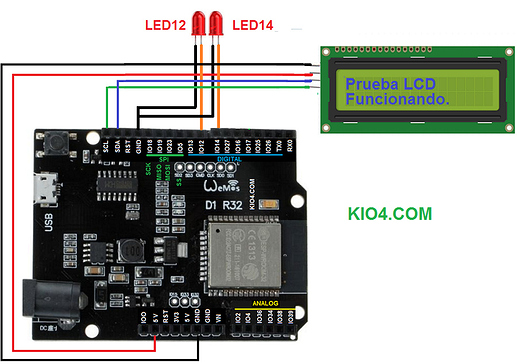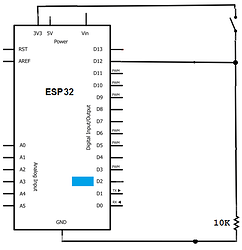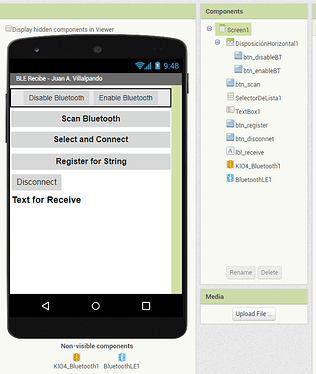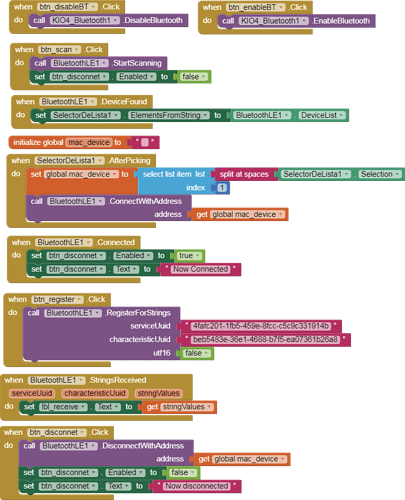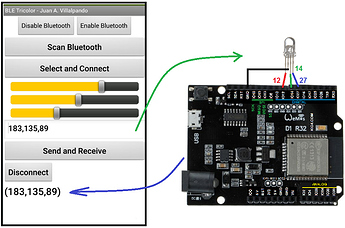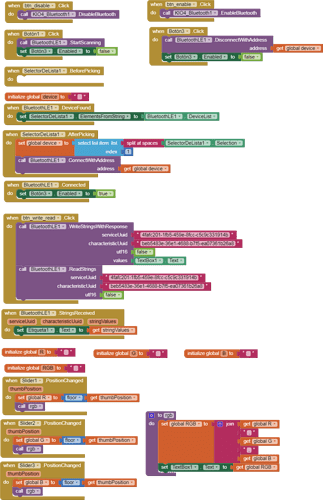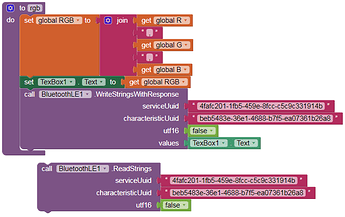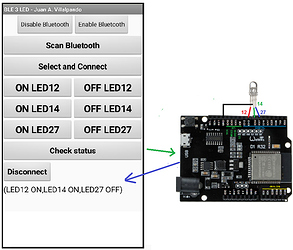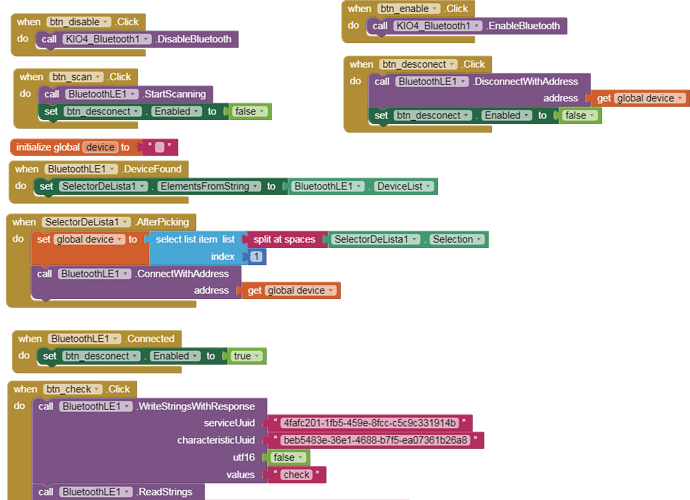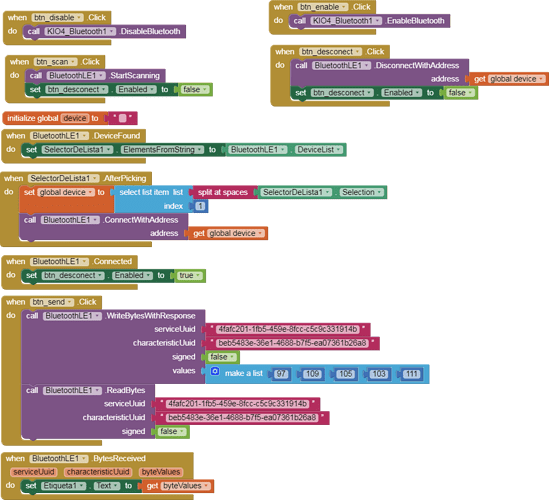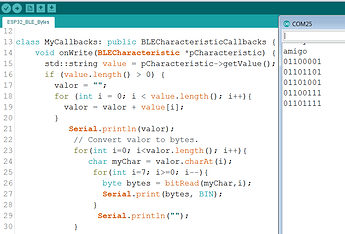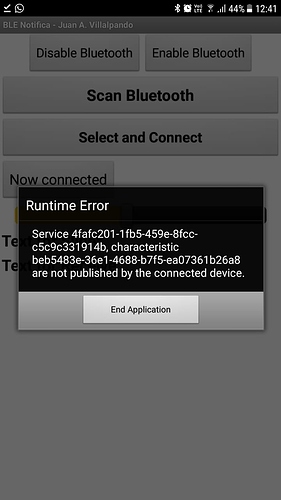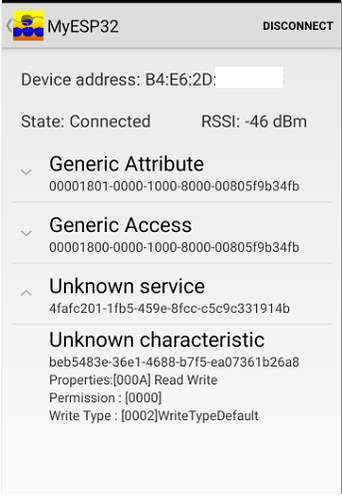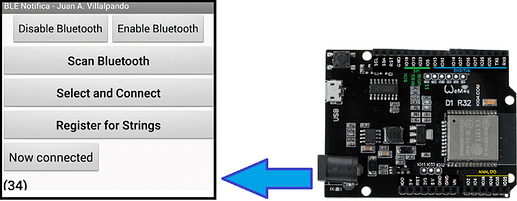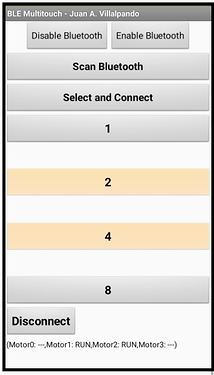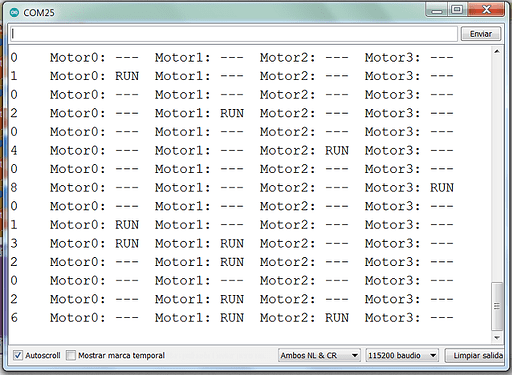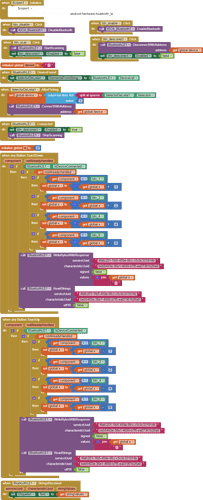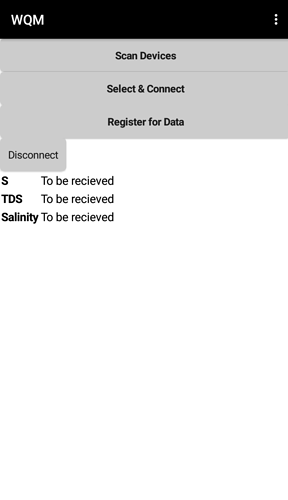Here a code with ESP32 working as classic Bluetooth and Screen LCD.
Sorry for the bother…
Is this a simple example for receive a command from Esp32 (or Arduino)?
I tried one.
I mean: We can turn on/off a led on Esp32 (Arduino) from cell phone.
But I am not able to turn on/off a “led” on cell phone from Esp32 (Arduino)…
I tried… But it works only if you repress on/off from cell phone…
So I am trying to make a simple app with a simple “ON” or “OFF” and in Esp32 (Arduino) building simple button… (simply writing on terminal)…
How do it???
“When BluetoothLE1.StringsReceived” doesn’t work…
Thanks
@}-,-’-------
Gianfranco
8.- PushButton in ESP2 sends HIGH/LOW to App Inventor. Notify.
p110_esp32_ble_notifica_Pulsador.aia (185.0 KB)
-
PushButton in pin12 of ESP32 sends “HIGH” or “LOW” to App Inventor by BLE Notify.
-
It also turns ON/OFF LED2 of the ESP32 (it is a LED_BUILTIN)
/* Based on Neil Kolban example for IDF: https://github.com/nkolban/esp32-snippets/blob/master/cpp_utils/tests/BLE%20Tests/SampleNotify.cpp Ported to Arduino ESP32 by Evandro Copercini updated by chegewara Create a BLE server that, once we receive a connection, will send periodic notifications. A connect hander associated with the server starts a background task that performs notification every couple of seconds. */ // Modificado por Juan A. Villalpando // http://kio4.com/arduino/160i_Wemos_ESP32_BLE.htm #include <BLEDevice.h> #include <BLEServer.h> #include <BLEUtils.h> #include <BLE2902.h> #define pin12 12 // pin12 PushButton #define pin2 2 // pin2 LED2 int valor12; // Status PushButton String output ="LOW"; // Output to App. Notify. BLEServer* pServer = NULL; BLECharacteristic* pCharacteristic = NULL; bool deviceConnected = false; bool oldDeviceConnected = false; uint32_t value = 0; #define SERVICE_UUID "4fafc201-1fb5-459e-8fcc-c5c9c331914b" #define CHARACTERISTIC_UUID "beb5483e-36e1-4688-b7f5-ea07361b26a8" class MyServerCallbacks: public BLEServerCallbacks { void onConnect(BLEServer* pServer) { deviceConnected = true; }; void onDisconnect(BLEServer* pServer) { deviceConnected = false; } }; void setup() { pinMode(pin12, INPUT); // pin12 PushButton pinMode(pin2, OUTPUT); // pin2 LED2 Serial.begin(115200); // Create the BLE Device BLEDevice::init("MyESP32"); // Create the BLE Server pServer = BLEDevice::createServer(); pServer->setCallbacks(new MyServerCallbacks()); // Create the BLE Service BLEService *pService = pServer->createService(SERVICE_UUID); // Create a BLE Characteristic pCharacteristic = pService->createCharacteristic( CHARACTERISTIC_UUID, BLECharacteristic::PROPERTY_READ | BLECharacteristic::PROPERTY_WRITE | BLECharacteristic::PROPERTY_NOTIFY | BLECharacteristic::PROPERTY_INDICATE ); // Create a BLE Descriptor pCharacteristic->addDescriptor(new BLE2902()); // Start the service pService->start(); // Start advertising BLEAdvertising *pAdvertising = BLEDevice::getAdvertising(); pAdvertising->addServiceUUID(SERVICE_UUID); pAdvertising->setScanResponse(false); pAdvertising->setMinPreferred(0x0); // set value to 0x00 to not advertise this parameter BLEDevice::startAdvertising(); Serial.println("Waiting a client connection to notify..."); } void loop() { // notify changed value if (deviceConnected) { pCharacteristic->setValue(output.c_str()); // Output pCharacteristic->notify(); valor12 = digitalRead(pin12); // Read pin12 --> valor12. ( 0 or 1) if (valor12 == HIGH) { digitalWrite(pin2, HIGH); // if valor12 is HIGH, set pin2 HIGH Serial.println("Pulsado"); output ="HIGH"; // Notify HIGH } if (valor12 == LOW) { digitalWrite(pin2, LOW); // If valor12 is LOW, set pin2 LOW Serial.println("No Pulsado"); output ="LOW"; // Notify LOW } delay(100); // bluetooth stack will go into congestion, if too many packets are sent. } // disconnecting if (!deviceConnected && oldDeviceConnected) { delay(500); // give the bluetooth stack the chance to get things ready pServer->startAdvertising(); // restart advertising Serial.println("start advertising"); oldDeviceConnected = deviceConnected; } // connecting if (deviceConnected && !oldDeviceConnected) { // do stuff here on connecting oldDeviceConnected = deviceConnected; } }
9.- App sends three values for a tricolor LED RGB. Receive those same values.
p110i_esp32_ble_LED.aia (236.1 KB)
// Juan Antonio Villalpando.
// http://kio4.com/arduino/160_Wemos_ESP32_BLE.htm
#include <BLEDevice.h>
#include <BLEUtils.h>
#include <BLEServer.h>
#include <Arduino.h>
#include <analogWrite.h>
String valor;
String red;
String green;
String blue;
int ind1;
int ind2;
int ind3;
#define SERVICE_UUID "4fafc201-1fb5-459e-8fcc-c5c9c331914b"
#define CHARACTERISTIC_UUID "beb5483e-36e1-4688-b7f5-ea07361b26a8"
class MyCallbacks: public BLECharacteristicCallbacks {
void onWrite(BLECharacteristic *pCharacteristic) {
std::string value = pCharacteristic->getValue();
if (value.length() > 0) {
valor = "";
for (int i = 0; i < value.length(); i++){
valor = valor + value[i];
}
Serial.print("valor = ");
Serial.println(valor);
ind1 = valor.indexOf(',');
red = valor.substring(0, ind1);
ind2 = valor.indexOf(',', ind1+1 );
green = valor.substring(ind1+1, ind2);
ind3 = valor.indexOf(',', ind2+1 );
blue = valor.substring(ind2+1);
Serial.print("red = ");
Serial.println(red);
Serial.print("green = ");
Serial.println(green);
Serial.print("blue = ");
Serial.println(blue);
Serial.println();
analogWrite(12, red.toInt());
analogWrite(14, green.toInt());
analogWrite(27, blue.toInt());
pCharacteristic->setValue(valor.c_str()); // Devuelve el valor.
}
}
};
void setup() {
analogWriteResolution(12, 8); // Resolución 8 bits
analogWriteResolution(14, 8);
analogWriteResolution(27, 8);
Serial.begin(115200);
BLEDevice::init("MyESP32");
BLEServer *pServer = BLEDevice::createServer();
BLEService *pService = pServer->createService(SERVICE_UUID);
BLECharacteristic *pCharacteristic = pService->createCharacteristic(
CHARACTERISTIC_UUID,
BLECharacteristic::PROPERTY_READ |
BLECharacteristic::PROPERTY_WRITE
);
pCharacteristic->setCallbacks(new MyCallbacks());
pCharacteristic->setValue("Iniciado.");
pService->start();
BLEAdvertising *pAdvertising = pServer->getAdvertising();
pAdvertising->start();
}
void loop() {
//
}
-
ESP32 does not have the AnalogWrite function, therefore we must download and install the analogWrite library from:
https://github.com/ERROPiX/ESP32_AnalogWrite -
Modifications:
Comment this line:
// pCharacteristic->setValue(valor.c_str()); // Return value.
Change this block:
-
http://kio4.com/arduino/160_Wemos_ESP32_BLE.htm#7 (in Spanish).
10.- From App ON/OFF 3 LEDs. Get status of the LEDs.
p110i_esp32_ble_3LED.aia (185.7 KB)
- We can use independent LEDs, in my example I have used a tricolor LED.
- Every time ON/OFF a LED we get a response.
- When we press “Check status” we obtain the status of the three LEDs.
// Juan Antonio Villalpando.
// http://kio4.com/arduino/160_Wemos_ESP32_BLE.htm
#include <BLEDevice.h>
#include <BLEUtils.h>
#include <BLEServer.h>
String valor;
#define LED12 12 // LED pin 12
#define LED14 14 // LED pin 14
#define LED27 27 // LED pin 27
String estado ="";
#define SERVICE_UUID "4fafc201-1fb5-459e-8fcc-c5c9c331914b"
#define CHARACTERISTIC_UUID "beb5483e-36e1-4688-b7f5-ea07361b26a8"
class MyCallbacks: public BLECharacteristicCallbacks {
void onWrite(BLECharacteristic *pCharacteristic) {
std::string value = pCharacteristic->getValue();
if (value.length() > 0) {
valor = "";
for (int i = 0; i < value.length(); i++){
valor = valor + value[i];
}
Serial.println(valor);
if (valor == "on12") {digitalWrite(LED12,HIGH); pCharacteristic->setValue("LED12 ON");}
if (valor == "off12"){digitalWrite(LED12,LOW); pCharacteristic->setValue("LED12 OFF");}
if (valor == "on14") {digitalWrite(LED14,HIGH); pCharacteristic->setValue("LED14 ON");}
if (valor == "off14"){digitalWrite(LED14,LOW); pCharacteristic->setValue("LED14 OFF");}
if (valor == "on27") {digitalWrite(LED27,HIGH); pCharacteristic->setValue("LED27 ON");}
if (valor == "off27"){digitalWrite(LED27,LOW); pCharacteristic->setValue("LED27 OFF");}
if (valor == "check"){
estado ="";
if (digitalRead(LED12) == HIGH) {estado = "LED12 ON,";} else {estado = "LED12 OFF,";}
if (digitalRead(LED14) == HIGH) {estado = estado + "LED14 ON,";} else {estado = estado + "LED14 OFF,";}
if (digitalRead(LED27) == HIGH) {estado = estado + "LED27 ON";} else {estado = estado + "LED27 OFF";}
pCharacteristic->setValue(estado.c_str()); // Return status
}
}
}
};
void setup() {
pinMode(LED12, OUTPUT);
pinMode(LED14, OUTPUT);
pinMode(LED27, OUTPUT);
Serial.begin(115200);
BLEDevice::init("MyESP32");
BLEServer *pServer = BLEDevice::createServer();
BLEService *pService = pServer->createService(SERVICE_UUID);
BLECharacteristic *pCharacteristic = pService->createCharacteristic(
CHARACTERISTIC_UUID,
BLECharacteristic::PROPERTY_READ |
BLECharacteristic::PROPERTY_WRITE
);
pCharacteristic->setCallbacks(new MyCallbacks());
pCharacteristic->setValue("Iniciado.");
pService->start();
BLEAdvertising *pAdvertising = pServer->getAdvertising();
pAdvertising->start();
}
void loop() {
//
}11.- App sends Bytes by WriteBytesWithResponse.
p110i_esp32_ble_Bytes.aia (184.3 KB)
- App sends list of Bytes as decimal numbers: 97,109,105,103,111 (ASCII: a,m,i,g,o)
- ESP32 receives those bytes and converts them to binaries:
01100001
01101101
01101001
01100111
01101111 - Return values as list.
// Juan Antonio Villalpando.
// http://kio4.com/arduino/160_Wemos_ESP32_BLE.htm
#include <BLEDevice.h>
#include <BLEUtils.h>
#include <BLEServer.h>
String valor;
#define SERVICE_UUID "4fafc201-1fb5-459e-8fcc-c5c9c331914b"
#define CHARACTERISTIC_UUID "beb5483e-36e1-4688-b7f5-ea07361b26a8"
class MyCallbacks: public BLECharacteristicCallbacks {
void onWrite(BLECharacteristic *pCharacteristic) {
std::string value = pCharacteristic->getValue();
if (value.length() > 0) {
valor = "";
for (int i = 0; i < value.length(); i++){
valor = valor + value[i];
}
Serial.println(valor);
// Convert valor to bytes.
for(int i=0; i<valor.length(); i++){
char myChar = valor.charAt(i);
for(int i=7; i>=0; i--){
byte bytes = bitRead(myChar,i);
Serial.print(bytes, BIN);
}
Serial.println("");
}
pCharacteristic->setValue(valor.c_str()); // Return valor
}
}
};
void setup() {
Serial.begin(115200);
BLEDevice::init("MyESP32");
BLEServer *pServer = BLEDevice::createServer();
BLEService *pService = pServer->createService(SERVICE_UUID);
BLECharacteristic *pCharacteristic = pService->createCharacteristic(
CHARACTERISTIC_UUID,
BLECharacteristic::PROPERTY_READ |
BLECharacteristic::PROPERTY_WRITE
);
pCharacteristic->setCallbacks(new MyCallbacks());
pCharacteristic->setValue("Iniciado.");
pService->start();
BLEAdvertising *pAdvertising = pServer->getAdvertising();
pAdvertising->start();
}
void loop() {
//
}
Check Serial Monitor:
This tutorial in Spanish.
@Juan_Antonio, I’m getting started with esp32 BLE connection and MIT app inventor. I don’t know what is happening, but I got this error when I try to use any off the apps. Can someone help me?
Note: I’m just copying and pasting both code and app
Location needs to be enabled for Bluetooth Low Energy Scanning.
Use ESP32_BLE.zip library in this page:
http://kio4.com/arduino/160_Wemos_ESP32_BLE.htm
You can Scan UUID with this app:
12.- Notify. Simple and didactic example.
- Notifications are well explained on this website:
https://openlabpro.com/guide/ble-notify-on-esp32-controller/
Important: each mobile device must have a CHARACTERISTIC_UUID. If you have multiple mobiles, set a CHARACTERISTIC_UUID for each one. You can generate UUID: https://www.uuidgenerator.net/
// Modified Juan A. Villalpando.
// http://kio4.com/arduino/160_Wemos_ESP32_BLE.htm
#include <BLEDevice.h>
#include <BLEServer.h>
#include <BLEUtils.h>
#include <BLE2902.h>
// Each client, mobile with a CHARACTERISTIC_UUID.
// Generate UUID: https://www.uuidgenerator.net/
#define SERVICE_UUID "4fafc201-1fb5-459e-8fcc-c5c9c331914b"
//#define CHARACTERISTIC_UUID "beb5483e-36e1-4688-b7f5-ea07361b26a8"
#define CHARACTERISTIC_UUID "d6f841fa-a37d-11ea-bb37-0242ac130002"
BLEServer* pServer = NULL;
BLECharacteristic* pCharacteristic = NULL;
bool deviceConnected = false;
int value = 0;
String valor = "";
// These functions will detect when the device is connected or disconnected.
class MyServerCallbacks: public BLEServerCallbacks {
void onConnect(BLEServer* pServer) {
deviceConnected = true;
};
void onDisconnect(BLEServer* pServer) {
deviceConnected = false;
}
};
void setup() {
Serial.begin(115200);
BLEDevice::init("MyESP32");
// Create BLE Server.
BLEServer *pServer = BLEDevice::createServer();
pServer->setCallbacks(new MyServerCallbacks());
// Create BLE Service with properties READ, WRITE, NOTIFY, INDICATE
BLEService *pService = pServer->createService(SERVICE_UUID);
pCharacteristic = pService->createCharacteristic(
CHARACTERISTIC_UUID,
BLECharacteristic::PROPERTY_READ |
BLECharacteristic::PROPERTY_WRITE |
BLECharacteristic::PROPERTY_NOTIFY |
BLECharacteristic::PROPERTY_INDICATE
);
// BLE descriptor.
pCharacteristic->addDescriptor(new BLE2902());
// Start BLE service.
pService->start();
// Start BLE advertising.
pServer->getAdvertising()->start();
}
void loop() {
if (deviceConnected) {
Serial.printf("*** NOTIFY: %d ***\n", value);
valor = (String) value;
pCharacteristic->setValue(valor.c_str()); // Set value.
pCharacteristic->notify(); // Notify value.
//pCharacteristic->indicate();
value++;
delay(800);
}
}
Hello Gianfranco
See below, June 1st, Notifications. You can use “Register for Strings” to receive data when it is available (every time it is available), rather than having to request it.
hmm, that cool
13.- Multitouch. Press several buttons at the same time.
p110i_esp32_ble_Multitouch.aia (204.6 KB)
In this topic we can see an example of Multitouch with/without Clock using classic Bluetooth:
- Let's see an example with BLE.
// Juan Antonio Villalpando.
// http://kio4.com/arduino/160_Wemos_ESP32_BLE.htm
#include <BLEDevice.h>
#include <BLEUtils.h>
#include <BLEServer.h>
String valor;
byte byte_received;
byte bytes;
#define LED12 12 // LED pin 12
#define LED14 14 // LED pin 14
#define LED27 27 // LED pin 27
#define LED16 16 // LED pin 16
String estado ="";
void motores();
#define SERVICE_UUID "4fafc201-1fb5-459e-8fcc-c5c9c331914b"
#define CHARACTERISTIC_UUID "beb5483e-36e1-4688-b7f5-ea07361b26a8"
class MyCallbacks: public BLECharacteristicCallbacks {
void onWrite(BLECharacteristic *pCharacteristic) {
std::string value = pCharacteristic->getValue();
if (value.length() > 0) {
valor = "";
for (int i = 0; i < value.length(); i++){
valor = valor + value[i];
}
byte_received = valor.charAt(0);
Serial.print(byte_received);
Serial.print(" ");
/** // print byte_received in byte, ejemplo: 00000110
// Convert valor to bytes.
for(int i=0; i<valor.length(); i++){
char myChar = valor.charAt(i);
for(int i=7; i>=0; i--){
bytes = bitRead(myChar,i);
Serial.print(bytes, BIN); // Binario
}
Serial.println("");
}
*/
motores();
pCharacteristic->setValue(estado.c_str()); // Return status
}
}
};
void setup() {
pinMode(LED12, OUTPUT);
pinMode(LED14, OUTPUT);
pinMode(LED27, OUTPUT);
pinMode(LED16, OUTPUT);
Serial.begin(115200);
BLEDevice::init("MyESP32");
BLEServer *pServer = BLEDevice::createServer();
BLEService *pService = pServer->createService(SERVICE_UUID);
BLECharacteristic *pCharacteristic = pService->createCharacteristic(
CHARACTERISTIC_UUID,
BLECharacteristic::PROPERTY_READ |
BLECharacteristic::PROPERTY_WRITE
);
pCharacteristic->setCallbacks(new MyCallbacks());
pCharacteristic->setValue("Iniciado.");
pService->start();
BLEAdvertising *pAdvertising = pServer->getAdvertising();
pAdvertising->start();
}
void loop() {
//
}
void motores(){
if (bitRead(byte_received, 0)){digitalWrite(LED12,HIGH); Serial.print("Motor0: RUN ");}
else {digitalWrite(LED12,LOW); Serial.print("Motor0: --- ");}
if (bitRead(byte_received, 1)){digitalWrite(LED14,HIGH); Serial.print("Motor1: RUN ");}
else {digitalWrite(LED14,LOW); Serial.print("Motor1: --- ");}
if (bitRead(byte_received, 2)){digitalWrite(LED27,HIGH); Serial.print("Motor2: RUN ");}
else {digitalWrite(LED27,LOW); Serial.print("Motor2: --- ");}
if (bitRead(byte_received, 3)){digitalWrite(LED16,HIGH); Serial.print("Motor3: RUN ");}
else {digitalWrite(LED16,LOW); Serial.print("Motor3: --- ");}
Serial.println();
estado ="";
if (digitalRead(LED12) == HIGH) {estado = "Motor0: RUN,";} else {estado = "Motor0: ---,";}
if (digitalRead(LED14) == HIGH) {estado = estado + "Motor1: RUN,";} else {estado = estado + "Motor1: ---,";}
if (digitalRead(LED27) == HIGH) {estado = estado + "Motor2: RUN,";} else {estado = estado + "Motor2: ---";}
if (digitalRead(LED16) == HIGH) {estado = estado + "Motor3: RUN";} else {estado = estado + "Motor3: ---";}
}
ThankYouuu
Hi Juan,
Thanks for this detailed tutorial. I am using the 6.- ESP32 sends automatically (Notify) a random number to App.. But my use requires me to get multiple analog readings and display them in different labels. Could you guide me on how it can be done? I am attaching the desired app screenshot.
Try this:
int aleatorio_1 = random(1,100); // Crea el numero random.
int aleatorio_2 = random(100,200); // Crea el numero random.
int aleatorio_3 = random(200,300); // Crea el numero random.
String alea = (String) aleatorio_1 + "," + (String) aleatorio_2 + "," + (String) aleatorio_3; // Lo convierte en String.
pCharacteristic->setValue(alea.c_str()); // Pone el numero random
pCharacteristic->notify();Hi Juan,
I am trying to send audio files from phone to sd card connected on esp32 board via its BT/BLE. Can you please help.
This tutorial is about send/receive image Android/Arduino by BT.
ESP32 works with Bluetooth classic and BLE, try with Bluetoot classic first.
Use small files to try.
Heey i followed the guide to send and receive data but i get this error everytime i run companion.
Error from Companion: java.lang.NoClassDefFoundError: edu.mit.appinventor.ble.BluetoothLEint$1
Then i get this when i press enable BT
invoke: no method named `EnableBluetooth' in class java.lang.Boolean
and goes like that .
Seems its the extensions causing it , i know for sure bluetoothLE is causing me issues cuz i can run the app without it ,but i need the extensions to read and send sensor data .
any ideas what this could be ?
Check that you are using the current version of the Companion, 2.60 or 2.60u
If that's not the problem, export and post your .aia file here.
Please export your project and post it here.
